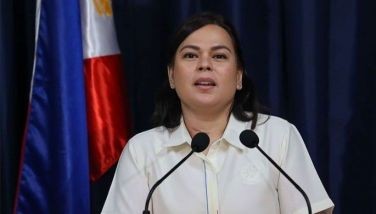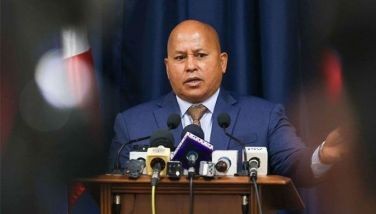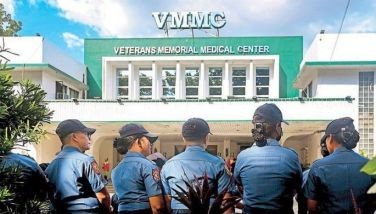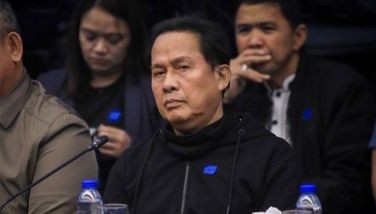Supreme Court asked to reverse ruling on electioneering
MANILA, Philippines - The Supreme Court was asked yesterday to reverse its ruling that reinstated disqualified Mayor Rosalinda Penera of Sta. Monica town in Surigao del Norte and which effectively removed the rule on premature campaigning during elections.
Petitioner Edgar Andanar, who lost to Penera in the 2007 mayoralty race, asked the High Court in his 11-page motion for reconsideration filed earlier this week to reinstate its Sept. 11, 2009 decision, which upheld Penera’s disqualification for premature campaigning in violation of Section 80 of the Omnibus Election Code.
“The prohibition on premature election campaign aims to level the playing field for candidates of public office, to equalize the situation between popular or rich candidates, on one hand, and lesser-known or poorer candidates on the other, by preventing the former from enjoying undue advantage in exposure and publicity on account of their resources and popularity,” Andanar argued.
He also said the intention for the implementation of Section 80 is to prevent the credibility of elections in the country from being compromised.
But in a 16-page resolution promulgated last Nov. 25, the SC reversed its earlier ruling and said that hopefuls in an election only become official candidates during the campaign period and therefore cannot be penalized for political activities before the start of the campaign period.
The ruling penned by Associate Justice Antonio Carpio upheld the provision in the poll automation law, which states that “any person who files his certificate of candidacy within (the filing) period shall only be considered a candidate at the start of the campaign period for which he filed his certificate of candidacy.”
This provision in the new election law in effect repealed Section 80 of the Omnibus Election Code, which provides that: “It shall be unlawful for any person whether or not a voter or candidate, or any party or association of persons, to engage in an election campaign or partisan political activity, except during the campaign period.”
The Court ruled that the legislative intent of lawmakers in passing the poll automation law clearly repealed Section 80 of the Omnibus Election Code.
The Court, in the same ruling, held that the ban on premature campaigning remains in effect despite implementation of the poll automation law or Republic Act 8436 as amended by RA 9369.
However, Andanar cited SC Associate Justice Roberto Abad’s dissenting opinion to the resolution dated Nov. 25, 2009, which states that “premature campaigning necessarily entails huge expenditures of funds on the part of the candidates, precipitate violence and even deaths, results in corruption of the electorate, and inflicts direful consequences upon public interest as the vital affairs of the country are sacrificed to purely partisan pursuits.”
He also maintained that the poll automation does not decriminalize premature election campaign and in fact does not dwell on the topic of premature election campaign but only with the filing of certificates of candidacy and on the manner of voting and counting the same.
Upholding its earlier position in Lanot vs. Comelec (Commission on Elections), the SC said that the only purpose for the early filing of COC is to give ample time to the Comelec for the printing of official ballots.
Marquez also stressed that based on the new ruling of the Court, infomercials and other advertisements of politicians joining the 2010 elections would now be considered as “exercise of freedom of expression.”
Eight other justices, including Chief Justice Reynato Puno, concurred in the decision. The others were Associate Justices Renato Corona, Conchita Carpio-Morales, Presbitero Velasco Jr., Arturo Brion, and Diosdado Peralta.
Justice Lucas Bersamin earlier favored the rule on premature campaigning and now opposed it. Justice Martin Villarama Jr., who replaced Justice Consuelo Ynares-Santiago who retired last Oct.5, voted with the majority.
Associate Justices Minita Chico-Nazario, Antonio Eduardo Nachura, Teresita Leonardo-de Castro, Mariano del Castillo and Roberto Abad dissented from the ruling.
Supreme Court spokesman Jose Midas Marquez explained that the retirement of Justices Santiago and Quisumbing, who voted in the earlier decision, “partly explains the change in the position of the Court.”
The Court granted the motion for reconsideration of Penera based on the provision of the poll automation law.
In its Sept. 11 ruling, the SC upheld the decision of the Comelec that found Penera guilty of violating the rule on
premature campaigning under Section 80 of the Omnibus Election Code.
Voting 8-7, the Court said in its 34-page ruling penned by Justice Nazario that Penera should be disqualified because she conducted a motorcade around three barangays in the municipality a day before the official campaign period started.
In her appeal filed Oct. 11, the disqualified mayor reiterated her main argument that she could not be disqualified for leading a motorcade in the municipality a day before the official campaign period had started under the election law.
Penera claimed that under the poll automation law, she could not be penalized for leading the motorcade because she has not yet filed her certificate of candidacy then and therefore could not be subjected to disqualification. – Edu Punay
- Latest
- Trending





























